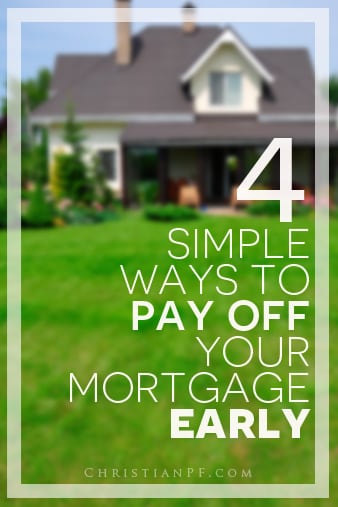
Buying a home is a major expense – and a major debt. It’s said it’s the biggest purchase you’ll make in your life.
A traditional mortgage loan is repaid over the course of 30 years, but today, some terms call for up to 40 years of repayment.
To some, three or four decades seem like an interminable amount of time to take to pay off a debt.
Quick Tip: Right now mortgage rates are very low, so if you are wanting to pay off your mortgage quicker, consider refinancing. Just click here to see how much you can save.
For those who aren’t looking to change the terms of their mortgage loan, such as refinancing to a lower interest rate or converting a 30-year loan to a 15-year loan, there are a few ways you can put a dent in the principal and lower the amount of interest paid in the following months and years.
While some folks claim that paying down the principal reduces the mortgage interest available to deduct on your federal tax return if you itemize, in the long run, you’ll still come out ahead. Take into consideration that your tax liability will likely increase incrementally if you’re already in the middle of paying off your mortgage.
Another argument against is that the extra money could be put into investments – but you’d have to make at least the same percentage return as your interest just to break even. Right now, that means playing the stock market or putting money into less-risky savings vehicles, such as CDs, which are barely paying 1% in some places. But don’t forget, these investments are taxable. Your mortgage interest can be used to reduce your tax burden.
If paying off your mortgage early is your aim, always ask if your lender allows prepayments, without penalty. You don’t want to pay toward the principal and get penalized for it. Also be sure your extra money is being put toward the principal, rather next month’s mortgage payment. That won’t reduce your interest payments.
Starting to pay off principle at any point during the term of the mortgage loan will help save you money, but start early on to make the most difference – the first half of the payments go toward interest. After the halfway point, the majority of your monthly payment goes to the principal.
Pain-Free Tips For Paying Off Your Mortgage Early!
Paul and Shirley have a 30 year fixed rate mortgage on a $200,000 loan. They are paying 5.5% APR and are motivated to pay that mortgage off early. I applaud their enthusiasm, but I also encourage them to examine their priorities before focusing on their mortgage debt. They should:
- Pay off all other debt. Why? Because getting rid of other debt will free up their cash flow to allow them to attack that mortgage with gusto.
- Save at least a six-month emergency fund. Why? Because emergencies WILL happen, and money tied up in their house cannot be easily accessed to pay for those emergencies.
- Be investing sufficiently for retirement. Why? Because they only have one shot at retirement. They should ask themselves this question, “If my retirement account was already on target, would I sacrifice it in order to pay my house off early?” Of course not, but neglecting their retirement account in order to pay their mortgage early is doing the same thing.
OK? Now, assuming Paul and Shirley have met these guidelines, here are five pain-free ways for them to pay off their mortgage early.
1. Make a payment every two weeks.
This approach is especially suited for those who are either paid weekly or bi-weekly because they can synchronize their mortgage payments to their pay schedule instead of the calendar. The strategy works because a payment every two weeks, in a year’s time, will total 26 payments, or the equivalent of 13 monthly payments– one extra payment per year. If Paul and Shirley choose this option, their 30-year mortgage will be gone in slightly less than 25 years.
Note: Many banks, because they are structured to process payments monthly, will not be able to accommodate the bi-weekly payment schedule. However, a diligent borrower can do this on his own by multiplying whatever he is paying now by 1.083 (or 13/12) in order to pay the equivalent of 13 payments a year.
2. Change their W-4 forms, get less refund, and pay extra on their mortgage.
Paul and Shirley, who are receiving a $3,000 refund from the IRS every year, could claim more exemptions on their W-4 forms in order to get a smaller refund and more take-home pay. If they were to plan for a $600 refund, they would have an extra $200 to add to their mortgage payment each month, lowering their payoff from 30 years to only 21 years.
3. Refinance and keep paying the same payment.
If Paul and Shirley could refinance their loan from 5.5% to 4.5%, and keep making the same payments, they would knock the mortgage out six years sooner.
4. Utilize pay raises.
Paul and Shirley’s current house payment is 25% of their take-home pay. If they continue to pay that same 25% as they receive future pay raises, they would be making incrementally bigger payments – a relatively pain-free strategy. Assuming these two get a 4% annual pay raise, this tactic would allow them to pay that 30-year mortgage off in slightly over 17 years.
Do all four!
What if Paul and Shirley decided to use all of our pain-free tips? It would look something like this:
- By changing their W-4 forms, their monthly payment would bump from $1135.61 to $1335.61.
- By paying bi-weekly, their equivalent monthly payment would become $1446.91 ($1335.61 x 1.08333).
- They will refinance to 4.5% with $1000 closing costs, and keep their payment the same ($1446.91).
- They will increase their payment by 25% of whatever ensuing pay raises they receive. We will assume pay raises of 4% annually.
Put it all together, and our happy couple will have paid their 30-year mortgage off in … drum roll, please … 12 years and 3 months!
We paid off our house in 3 years – see how in the video below!
Readers: Have you been trying to pay your mortgage early? What additional tips do you have?




